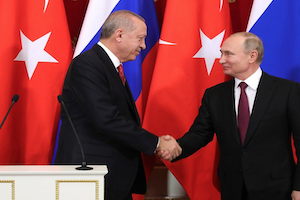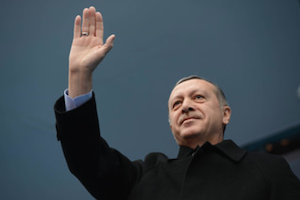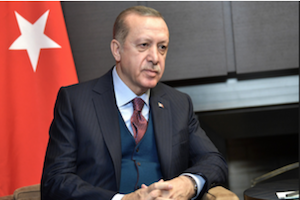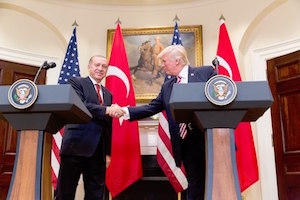Turkey's Russia Affair
By Suat Kınıklıoğlu
September 23, 2019
Turkey’s deepening partnership with Russia needs to be situated within a larger context. Turkey is moving closer toward Russia at a time when the West is beset by considerable turmoil. Seen from Ankara, both Europe and the U.S. increasingly look weaker, divided and ideologically adrift. Above all, though, Ankara’s pivot toward Moscow is driven by the domestic political needs of the Turkish leadership. The primary benefit of deepening the relationship with Russia lies in the legitimization of the current authoritarian rule. Yet ultimately the endeavor to reorient Turkey toward Russia and Eurasia faces the challenge that Turkey’s democratic tradition poses.

The Deeper Dynamics of the Istanbul Rerun
By Halil Karaveli
May 16, 2019
In Turkey, appearances tend to be deceiving. It is a mistake to take the cancellation of the Istanbul election result as proof that President Recep Tayyip Erdoğan refuses to accept defeat at the polls. The Kurdish vote decided the outcome in Istanbul, exposing the vulnerability of a system that was supposed to neutralize the influence of the Kurdish political movement. The Istanbul rerun speaks of the power of Devlet Bahçeli, the nationalist leader, and of the state cadres who see the victory of an opposition in tacit alliance with the Kurdish movement as an existential threat to the state. Erdoğan did not dare to challenge them.

Is the AKP Headed Toward a Historic Defeat?
By M.K. Kaya
March 29, 2019
There is every reason to expect that Turkey’s municipal elections on March 31 will be a major setback for the ruling AKP and that they will set in motion developments that are going to alter the political landscape of the country. The AKP may be headed toward what will prove to be a historic defeat. The elections are pregnant with consequential political changes that are going to affect the nature of the Turkish regime, its Kurdish policies as well as Turkey’s relations to the West.

Defying Denial: Turkey's Kurds and the March 31 Local Elections
By Gareth H. Jenkins
March 27, 2019
Despite intense pressure from the Turkish state, including the imprisonment of a large proportion of its leadership, the Peoples’ Democratic Party (HDP) is again expected to win the majority of votes in the predominantly Kurdish southeast of the country in the nationwide local elections on March 31, 2019. But President Recep Tayyip Erdoğan’s repeated public threat to prevent HDP officials from holding office means that, for Turkey’s Kurds, the election will be less about choosing who will run their local authorities than their own identity amid a growing conviction that their future lies in a considerably looser relationship with the central government in Ankara.

The Kurdish "Other" and the American Enemy Ensure the Cohesion of Turkey's Nationalist Regime
By Cengiz Çandar
February 14, 2019
The perception of a Kurdish threat from Syria, abetted by the United States, has provided the Turkish regime with its raison d’être. It is the glue that holds the power coalition of a variety of ultranationalists together. As long as the regime of President Recep Tayyip Erdoğan relies on the Kurdish “other” for its internal cohesion – and ultimately for its survival – that imperative will continue to determine Turkish foreign policy. But Turkey’s strategic reorientation is also sustained by a long history of deep-seated suspicion of American motives. Indeed, Turkish-American relations were never harmonious and their history has taught the Turkish state elite not to trust the United States, and never before had so much been at stake as today.



